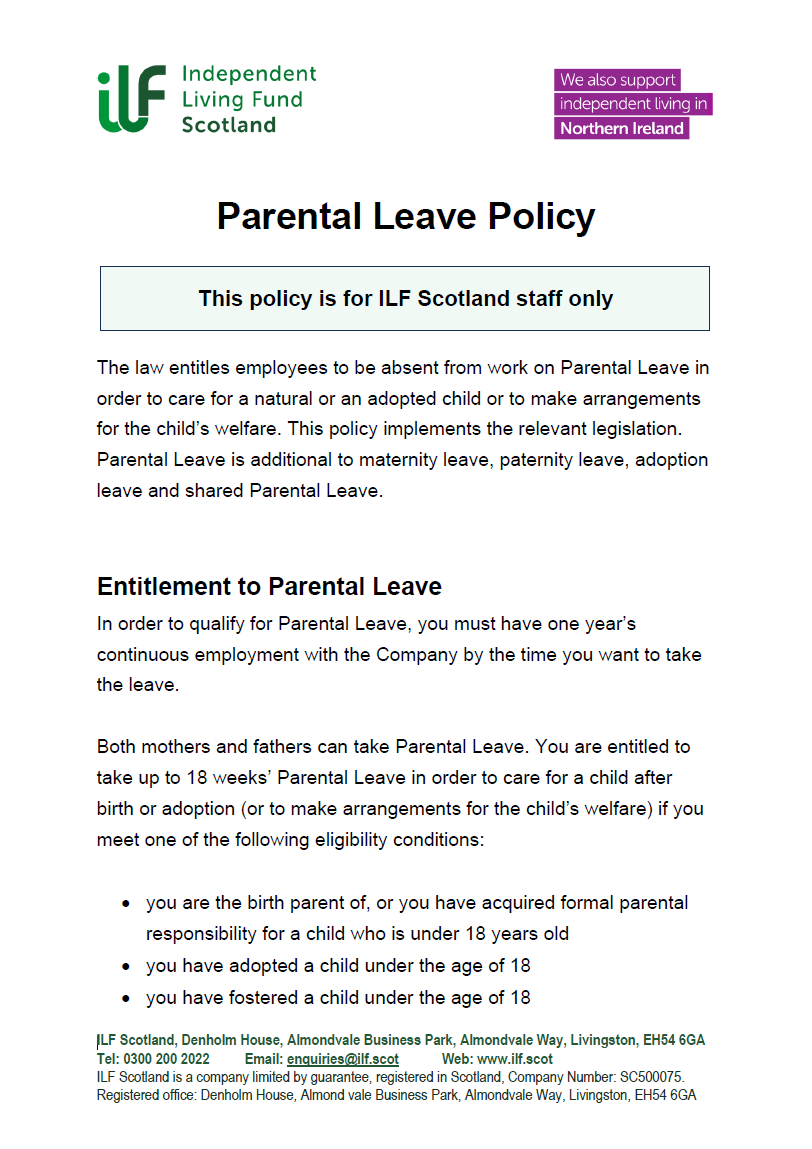
The law entitles employees to be absent from work on Parental Leave in order to care for a natural or an adopted child or to make arrangements for the child’s welfare. This policy implements the relevant legislation. Parental Leave is additional to maternity leave, paternity leave, adoption leave and shared Parental Leave.
In order to qualify for Parental Leave, you must have one year’s continuous employment with the Company by the time you want to take the leave.
Both mothers and fathers can take Parental Leave. You are entitled to take up to 18 weeks’ Parental Leave in order to care for a child after birth or adoption (or to make arrangements for the child’s welfare) if you meet one of the following eligibility conditions:
In the case of birth parents, you must be named on the child’s birth certificate.
All periods of Parental Leave are unpaid. There is no contractual or statutory entitlement to be paid for absences relating to Parental Leave.
Assuming you are eligible, you can choose to take Parental Leave at any time.
However, you cannot exercise any entitlement to Parental Leave in respect of a child after the date of the child’s 18th birthday.
Parental Leave is for each child, so in the case of twins, 18 weeks’ leave is provided for each child.
Parental Leave must be taken in blocks of a week or multiples thereof, unless the child is disabled.
A maximum of four weeks’ Parental Leave can be taken in respect of any child during any one year, beginning on the date on which you first became entitled to take Parental Leave in respect of the child in question (or, if your entitlement has been interrupted at the end of a period of continuous employment, the date on which you most recently became so entitled) and each successive period of 12 months beginning on the anniversary of that date.
Each parent is entitled to Parental Leave.
You are required to give at least 21 days’ written notice to your line manager of your proposed Parental Leave dates. If leave is to be taken immediately after birth or adoption, 21 days’ written notice of the expected week of childbirth or the expected week of placement for adoption should be given. You must specify the dates on which your period of Parental Leave is to start and finish. If it is not reasonably practicable for you to comply with the 21 days’ notice requirement, you should give notice as soon as reasonably practicable. A Parental Leave form can be obtained from HR.
If you give notice that you wish your leave to start on the date of birth or adoption and that date is sooner or later than expected, your leave will begin on the actual date of birth or adoption.
At the time of requesting Parental Leave, you should:
The period of 18 weeks’ leave is the maximum you can take and periods of leave taken with a previous employer will be taken into account when calculating this period. Independent Living Fund Scotland (ILF Scotland) will expect you to declare periods of leave with a previous employer at the time of making a Parental Leave request. ILF Scotland may also check with your previous employer how much Parental Leave you have taken at your previous employment.
ILF Scotland reserves the right to postpone a period of Parental Leave for up to six months where it considers that the operation of its business would be unduly disrupted if the leave were to be taken at the time requested. For example, leave may be postponed during particularly busy periods, seasonal peaks or where a significant proportion of ILF Scotland’s staff has already applied to be off from work at the same time.
ILF Scotland will confirm any postponement arrangements after receipt of your request to take Parental Leave. This letter will state the reason for postponement and set out the proposed new dates of Parental Leave. ILF Scotland will attempt to agree with you a suitable alternative date when Parental Leave can commence.
ILF Scotland will not, however, postpone leave where you have given notice to take it immediately after the time the child is born or is placed with you for adoption.
During Parental Leave your contract of employment continues. You are entitled to all of your statutory employment benefits, but some contractual benefits can be suspended by ILF Scotland, including pay. your seniority, pension rights and rights to any other service-related benefits are unaffected by Parental Leave.
At the end of Parental Leave, you will be entitled to return to the same job on the same terms and conditions as if you had not been absent, provided always that your period of Parental Leave was for a period of four weeks or less and your total consecutive statutory leave taken in relation to the child (including any time on Maternity, Paternity, Adoption or Shared Parental Leave, but excluding your Parental Leave) amounts to no more than 26 weeks.
Where you have taken more than 26 weeks’ consecutive statutory leave in total (including any time on Maternity, Paternity, Adoption or Shared Parental Leave, but excluding your Parental Leave) or your Parental Leave period is more than four weeks, again you will be entitled to return to the same job on the same terms and conditions as if you had not been absent. If, however, there is some reason why it is not reasonably practicable for ILF Scotland to take you back in your original job, you will be offered suitable alternative work of equivalent status and responsibility and on terms and conditions that are no less favourable than would have applied if you had not been absent.
ILF Scotland will keep records of Parental Leave taken. If you act dishonestly in claiming an entitlement to Parental Leave, this is a serious disciplinary offence and will be dealt with under ILF Scotland’s Disciplinary Procedure. This includes attempting to claim leave for a child who is too old, claiming leave for purposes other than caring for a child or misleading ILF Scotland about Parental Leave taken with a previous employer. Depending on the seriousness of the offence, it may amount to gross misconduct and could result in your summary dismissal.
We will process your data in relation to this policy for legitimate business purposes. We will also retain records of any correspondence, reports, meetings, hearings and associated documentation in relation to this policy. Such records will be retained in accordance with our Data Retention Schedule.
We may also share your data with third parties, such as previous employers, where necessary.
